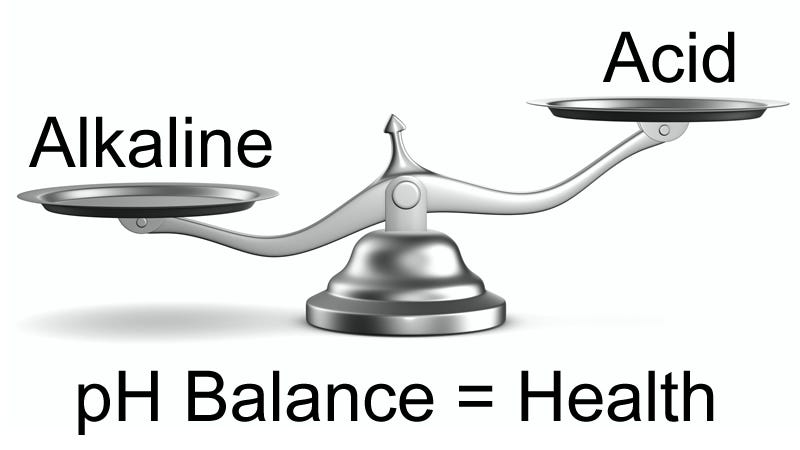The acid-alkaline balance, or pH balance, is a fundamental pillar of human health. Our bodies possess intricate systems to maintain precise pH levels in various fluids and tissues, a balance essential for optimal enzyme activity, protein function, mineral balance, oxygen delivery, and immune response.
This pH balance isn’t just a theoretical concept, but a fundamental requirement for overall health and well-being. It affects virtually every aspect of our physiology, from the molecular level to the functioning of our organs and systems.
The Attack on Alkalinity
Here’s where it all gets interesting to me. Experts tell us that there is limited evidence that an alkaline diet prevents disease. They precariously assert that the blood’s pH levels are tightly regulated, and thereby largely unaffected by outside factors such as diet. This is a preposterous statement in light of how many studies actually exist to dispute this notion.
The crux of the matter lies in the pivotal role of interstitial fluid (ISF) permeating the spaces between cells throughout the body. Unlike blood, ISF is more prone to becoming acidic due to its limited buffering capacity. This vulnerability to pH fluctuations, coupled with ISF’s connection to blood pH, makes the negativity surrounding the acid/alkaline theory particularly curious.
In effect, any changes in interstitial fluid pH can indirectly impact blood pH, as there is a constant exchange of substances between the two.
Here’s how this breaks down:
Cellular Function: Unhealthy diets can impair cellular function and metabolism. This can lead to the production of more acidic byproducts, which can further contribute to acidosis in both ISF and eventually, the blood.
Diffusion and Exchange: There's a constant exchange of substances between interstitial fluid and blood. If ISF becomes more acidic, this can gradually influence blood pH through diffusion and exchange across capillary walls.
So the core of the acid/alkaline debate revolves around the often underestimated influence of interstitial fluid pH on blood pH. An unhealthy diet, among other factors, can directly affect the health of fluids, tissues, and organs throughout the body. While the body does have mechanisms to initially compensate for imbalances, a persistent onslaught can eventually overwhelm the entire system, leading to compromised health and eventual disease.
The complexity of the science behind acidosis shouldn't negate its existence. Diseases have causes, and the evidence suggests that acidosis plays a significant role as a culprit.
How Diet Affects Interstitial Fluids
As we have seen, diet significantly influences the composition and pH of interstitial fluid. Acid-forming foods like animal protein and processed foods (primarily in the form of sulfuric acid from sulfur-containing amino acids) can create an acidic ISF environment, while alkaline-forming foods like fruits and vegetables help neutralize excess acid and raise ISF pH.
While experts like to say that food alkalinity is an oversimplification of complex metabolic processes, all we have to do is follow the trail of proof:
An unhealthy diet
This dietary intake leads to an acidic interstitial fluid environment.
The ISF relationship to blood can be traced through impaired cellular function and metabolism, as well as diffusion and exchange of substances with blood.
Compensation mechanisms through ISF acidity are eventually overwhelmed, leading to shifts in blood pH.
This last point can’t be overemphasized enough, because it is the pillar on which the scientific denial of the alkaline diet's impact rests. A consistently healthy blood pH is a direct result of an alkaline diet. Shifting towards a highly acidic diet overwhelms the body’s buffering systems and paves the way for disease. There is the cause and the effect!
Acidity’s Effects
From Mercola.com:
"Metabolic acidosis is a chronic condition that many people in the Western world have but do not realize it … A normal healthy body has numerous buffering systems to combat acid accumulation. However, if your buffering capacity is reduced or cannot meet the acid load, then harms can ensue such as a breakdown of muscle, connective tissue and bone …"
The primary sources of acidity in the diet are sulfur-containing amino acids, salt, and phosphoric acid in soft drinks (IMCJ 13.6). Salt is everywhere, that’s no great mystery. But research also reveals that we consume far more phosphorus than the recommended dietary allowance (RDA) (700 mg/d for adults). Some individuals’ daily phosphorus intake exceeds even an adult’s tolerable upper limit (4000 mg/d). To avoid this, you must also avoid processed foods, virtually all of which are laden with phosphate/salt-containing food additives. (Also Nutrients 2017, 9(6), 538)
Even low-grade metabolic acidosis can lead to:
Type 2 diabetes, insulin resistance increased gluconeogenesis, high blood pressure, bone loss, osteoporosis and osteopenia, sarcopenia, muscle loss, gout, fibromyalgia, declines in kidney function and mineral deficiencies among other effects.
How To Achieve Bodily Alkalinity
Be sure to get your greens daily – first through foods, then green powders, primarily made from spirulina or chlorella and the juices of various types of grasses like barley, wheat, or alfalfa are easy to take in a smoothie and not only help to raise alkalinity.
Alkalinity supplies important nutrients that help stop rapid degeneration of tissues, bone mass and disease.
Finally, there are special foods/formulations designed specifically for balancing body chemistry.
Food grade hydrogen peroxide drops (1 teaspoon daily of 3% HP).
Baking soda (sodium bicarbonate) in water and on an empty stomach. - 1/2 teaspoon daily.
Citrus fruits
Fruit/vegetable shakes
Green vegetable/fruit powders
Soups
Lemon water
Propolis
Herbal teas
In simple terms, your body goes through a complicated process to make sure your blood pH stays balanced and won’t rob nutrients from elsewhere, IF you eat a balanced diet to support your body’s natural processes!
Experts either know this and are either deliberately protecting their medical authority by withholding the benefits of alkaline foods', or are genuinely unaware of this vital aspect of optimal health. Given the runaway statistics on disease and suffering today, it’s a logical assumption that they’re dead wrong either way.
Your presence here is greatly valued. If you've found the content interesting and useful, please consider supporting it through a paid subscription. While all our resources are freely available, your subscription plays a vital role. It helps in covering some of the operational costs and supports the continuation of this independent, unbiased research and journalism work. Please make full use of our free library.







![[DIAGRAM] Diagram Of Interstitial Fluid - MYDIAGRAM.ONLINE [DIAGRAM] Diagram Of Interstitial Fluid - MYDIAGRAM.ONLINE](https://substackcdn.com/image/fetch/w_1456,c_limit,f_auto,q_auto:good,fl_progressive:steep/https%3A%2F%2Fsubstack-post-media.s3.amazonaws.com%2Fpublic%2Fimages%2F2814aaf4-c1dc-49c9-a8d8-bbdf2ab1d71f_779x364.jpeg)

